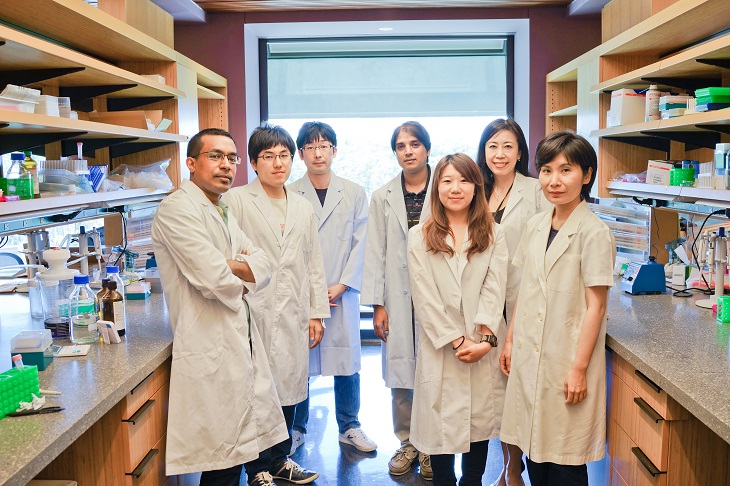FY2014 Annual Report
Immune Signal Unit
Assistant Professor Hiroki Ishikawa
Abstract
Immune signal unit studies immune mechanisms causing diseases. Immune system has developed to defend our body against invading pathogens, although dysregulation of the system can cause diverse diseases including allergy and autoimmune diseases. An important event in immune responses is generation of helper T cells. Upon recognition of a specific antigen, naïve CD4 T cells differentiate into several effector helper T subsets which lead to different outcomes of immune responses. T helper 17 (Th17) subset plays a central role in many of autoimmune diseases. Cytokines TGF-b and IL-6 are required for the priming of Th17 differentiation. However, another cytokine IL-23 is essential for generation of disease-causing Th17 cells. We are focusing on the mechanism of IL-23-dependent pathogenic Th17 generation. In FY2015, we continued to characterize new genes and pathways which might be involved in generation of pathogenic Th17 cells.
1. Staff
- Hiroki Ishikawa, Assistant Professor
- Hayato Yamada, Postdoc
- Zafrul Hasan, Postdoc
- Bijay Parajuri, Postdoc
- Saori Nishijima, Technician
- Shiho Okitsu, Technician
- Rika Yoshizawa, Research Administrator
2. Collaborations
Nothing to report.
3. Activities and Findings
CD4 T helper (Th) cells play a critical role in orchestrating adoptive immune responses against not only various pathogens infection but also self-antigen triggering autoimmunity. Upon recognition of a specific antigen, naïve CD4 T cells differentiate into different effector subsets. Among them, recently identified Th17 is involved in various autoimmune diseases. Cytokines TGF-b and IL-6 are required for the priming of Th17 differentiation. However, another cytokine IL-23 is essential for the full differentiation of pathogenic Th17 cells. Although the critical role of IL-23 for pathogenic Th17 differentiation has been demonstrated, the molecular mechanism of IL-23-dependent pathogenic Th17 differentiation remains unknown.
To elucidate the mechanism of IL-23-dependent pathogenic Th17 differentiation, we screened IL-23 responsive genes by microarray analyses and identified several genes whose expression was upregulated by IL-23. In Fy2014, we sought to identify transcription factors which are involved in this IL-23-dependent transcriptional regulation. Based on the public microarray data, we selected 230 transcription factors highly expressed in Th17 cells. Retroviruses expressing shRNAs against these transcription factors were individually transduced into Th17 cells generated in the presence of IL-6, TGF-b and IL-23. To evaluate the effect on IL-23-dependent signaling, we measured the level of enpp2 mRNA whose induction was upregulated by IL-23. As a top hit, we identified one transcription factor whose knockdown resulted in a significant reduction of enpp2 expression in Th17 cells. To study the physiological function of this transcription factor, we generated knockout mouse of the gene. The knockout mice had normal development of immune cells including CD4 and CD8 T cells, B cells and dendritic cells. We are currently characterizing the phenotype of the knockout mice.
4. Publications
Nothing to report.
4.3. Oral and poster presentation
- Ishikawa, H. HLX1 regulates differentiation and function of CD4 T helper cells. 22nd East Asia Joint Symposium on Biomedical Research, Onna, Okinawa, 2015
5. Intellectual Property Rights and Other Specific Achievements
Nothing to report.
6. Meetings and Events
Nothing to report.




